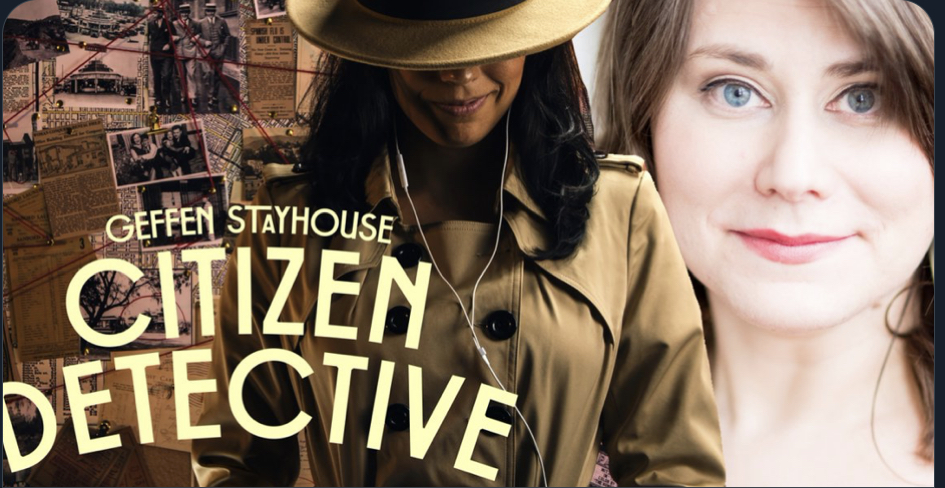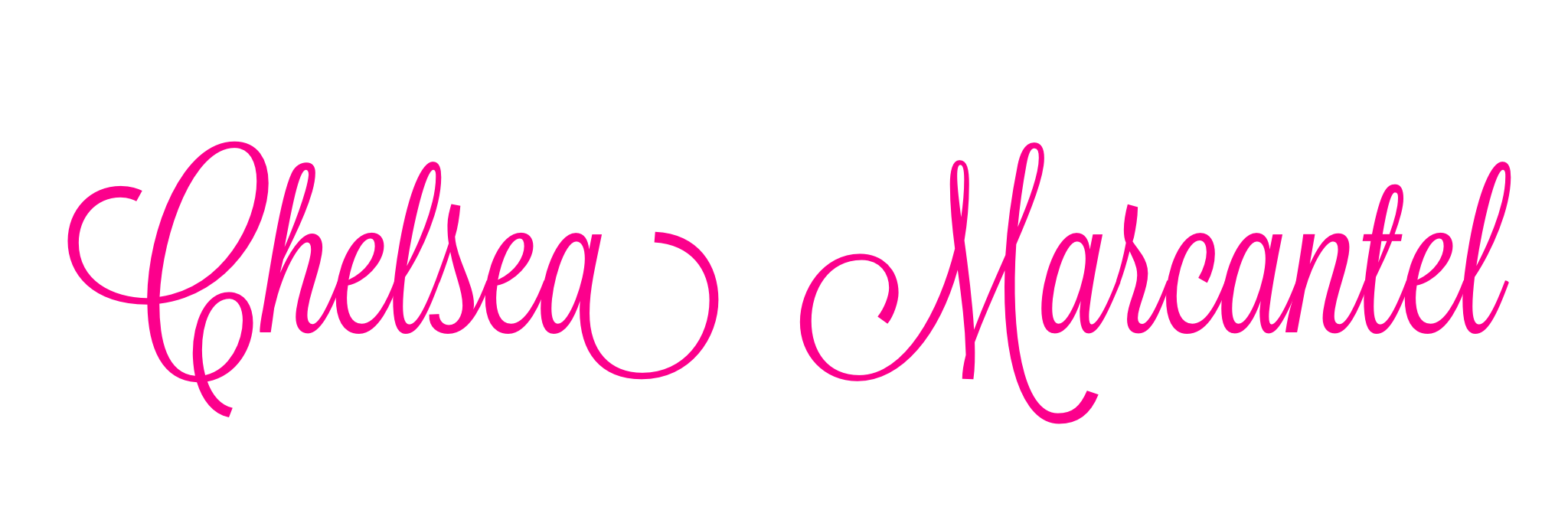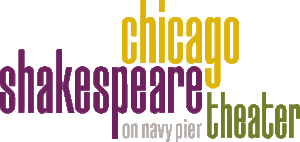Specifically written for Zoom, playwright/director Chelsea Marcantel has fashioned a mystery who-done-it with the Zoom audience as the solving detectives.

by Gil Kaan Nov. 9, 2020
CITIZEN DETECTIVE, Geffen StayHouse’s third production, has already been sold out, just as the first two did. Specifically written for Zoom, playwright/director Chelsea Marcantel has fashioned a mystery who-done-it with the Zoom audience as the solving detectives. Best-selling true crime author Mickie McKittrick (played by Morgan Rusler) will guide the Zoom participants as they form into smaller break-out groups to follow the clues laid-out in this 1920’s unsolved Hollywood murder. Also in this two-actor cast, Paloma Nozica as Andrea.
Thank you for taking the time for this interview, Chelsea!
How are your virtual rehearsals going?
The rehearsal process is going well – and very fast! Because the audience is such a crucial part of the flow and timing of the show, we only had three rehearsal days before we performed the show with play-testers. And things are always being recalibrated based on audience reactions and feedback. We’re all working from a massive live Google Doc. It’s unlike any other rehearsal process I’ve ever been part of.
You’ve written an impressive number of plays. What challenges did you surmount in writing CITIZEN DETECTIVE specifically to be performed via Zoom, as opposed to being performed live on a theatre stage?
When I started working on CITIZEN DETECTIVE, I didn’t want to try to shoehorn an idea I’d had for the stage into this new medium and hope for the best. I’d been to enough Zoom plays, and cocktail parties, and even weddings by August of 2020 that I had some strong ideas about what we were going to need to pull this off. And the folks at The Geffen have been doing interactive Zoom experiences for months now, so they know all kinds of creative ways to “hack” the software and make it do things the casual user would never know to try. So, I knew going in I was in the best of hands, but still we’ve faced some hurdles.
The most obvious one is the microphone situation on Zoom; it’s built to prioritize one microphone at a time, which means it’s hard to achieve the normal conversational flow that you get in a scene onstage. Interruptions and overlapping dialogue are frustratingly hard to pull off. But also: body language and reactions are flattened and delayed. Actors can’t read each other’s subtle non-verbal cues in the same way they can in person – and they can’t give the audience those body language cues, either. Ultimately, I ended up doing a lot of reading about Zoom fatigue and what it is that our brains are actually processing when we receive information through this platform, and tried to lean into it instead of fighting it.
How great to have an in-house sound and projection designer for all your Zoom meetings and projects, your husband Miles Polaski. Will Miles be part of your tech crew for CITIZEN DETECTIVE?
Miles is absolutely my favorite sound and projection designer to work with, but in the context of this show, we’re not making use of his skills (other than as a willing play-tester). We’ve got fantastic Geffen designers working on costumes, props, and “sets,” creating little shadowboxes for the characters to live in, but otherwise we’re acknowledging that we’re all on Zoom – characters, audience, everyone – and not trying to create another theatrical layer on top of that.
What were the first murder mysteries that activated your sleuthing brain tickles?
I got a huge compendium of The Complete Sherlock Holmes when I was nine, and I still have it. I was obsessed. I still love detective fiction, especially if the person solving the crimes isn’t a hard-boiled detective, but comes to the mystery from a place of optimism and belief in the goodness of human beings (e.g., The Father Brown mysteries, The Phryne Fisher books). It was definitely fictional crime that I got into first, and then when I got a bit older, that interest lead me into true crime. Which is hardly ever as satisfying at its conclusion, but feels more immediate and has a higher creep factor.
Historically, there has always been a lot of focus on the perpetrators of crimes, especially the charismatic ones, which meant the victims got lost in the shuffle. Also, for the last fifty years or so, true crime has favored “murdered cheerleaders and cheerleaders who murder,” elevating those kinds of sensational narratives over the stories of people who are statistically much more likely to be killed (queer people, trans people, people experiencing homelessness, people of color). Within just the last few years, those biases are beginning to be acknowledged and examined. And with the internet always at our fingertips now, armchair sleuths are beginning to see real-world results from their dedication to cold cases. On a lot of fronts, I think we’re at an exciting turning point for fans of true crime.
What do you consider to be the vital components of a great murder mystery?
The audience needs to be set up for success as much as possible. They need to be given access to every location and motivation and bit of information that is needed to solve the mystery, even if they don’t know how to put those pieces together right away. That’s what makes the conclusion of a mystery ultimately satisfying and not frustrating – it teaches you a new way to look at the familiar world. Tricking the audience or leading them astray or hiding things from them is antithetical to the experience. If the protagonist has a vested personal interest in solving the case, and a skillset or backstory that makes them uniquely suited to take it on, that’s the icing on the cake.
Your relationship with The Geffen Playhouse dates back to 2018 when you were picked as one of six writers to participate in their inaugural cycle of The Writers Room. What beginnings of script ideas or nuggets of knowledge came out of that experience?
The best thing that came out of that experience was that I felt like I found a theatrical home in L.A. I had just moved from New York and didn’t know many theatre people, and I wasn’t sure how to establish a new community. The Writers Room not only gave me a place to work on a brand new script idea, but it also introduced me to a theatre doing exciting, compelling work – and five other L.A.-based playwrights who have become dear friends and are still my monthly writing group.
The play that I began work on in the Writers Room is now under a finishing commission from The Geffen. It’s called VANISHING ACT and it’s about the role of women in stage magic from 1920 to the present day. We’re still collaborating on that play together, and down the line, I hope we’ll be able to present it onstage for a live audience as intended.
You’ve taught classes at Emory and Henry College and Virginia Intermont College. Do you see similarities in your approaches and objectives as a teacher and as a director?
I’ve definitely called upon my teaching experience in the writing and directing of CITIZEN DETECTIVE. The most useful knowledge that I bring to this process from teaching is that you have to let the audience make their own discoveries. You could just tell him upfront how to solve for x, but then they don’t get those fun and satisfying “lightbulb moments.” Our approach to this show is built on the question “How do we set them up for success?” We want to create an experience in which all the victories belong to the audience.
How did your initial reaction to winning the 2018 M. Elizabeth Osborn New Play Award from the American Theatre Critics Association for AIRNESS compare to having August 23, 2013 declared “Chelsea Marcantel Day in Pike County, Kentucky”?
They were both very exciting in totally different ways. The award in 2018 was really lovely and meant a lot, because it came from the American Theatre Critics Association and it showed appreciation for AIRNESS, my first kind of breakout play. AIRNESS got a lot of love from critics, who see A LOT of plays, and it was nice to feel like all the work we put into that show had created something that really resonated with people from across the country.
“Chelsea Marcantel Day” was a very humbling thing to happen – that was based on my play BLOOD SONG: THE STORY OF THE HATFIELDS AND THE MCCOYS. This play has been performed in Pike County every summer since I wrote it in 2013. I wrote it on commission for that community, working with theatre-makers and historians within that community, and I deeply wanted it to be something that the people of Pike County would be proud of. I’m from southwest Louisiana, and I know what it’s like to have your culture misrepresented and mocked by writers who don’t take the time to get to know the people they’re writing about. I did my very best to reflect back to that community the values that they modeled for me, while telling the real human stories of the Hatfield/McCoy feud in a historically accurate way. The plaque that they gave me on Chelsea Marcantel Day was inscribed: “for her beautiful, insightful, and truthful original script filled with the dynamic characters and language of Appalachia.” It was deeply touching and I’m just so happy that they felt their culture was honored and understood.
Any new projects tentatively scheduled in the near future?
In addition to the commission I mentioned from The Geffen, I’m also working on new play commissions from Cleveland Playhouse and Signature Theatre in DC, as well as a new musical commission from Chicago Shakespeare Theatre. I’ve also got musical projects in the works in New York with producers Jeffrey Richards, Blue Spruce, and STK Productions. All the projects are completely different in subject matter, which means I get to throw myself down a lot of different research wormholes. And that is truly what’s getting me through this weird pandemic season – research wormholes and making shows on Zoom that recreate some aspects of the live, in-person theatrical experience we’re all missing so much.
Thank you again, Chelsea!
I look forward to matching my sleuthing wits with your CITIZEN DETECTIVE.
Although sold out through its December 20, 2020 run, sign up at www.geffenplayhouse.org/tickets/citizen-detective-notification/ for cancellation notifications.






